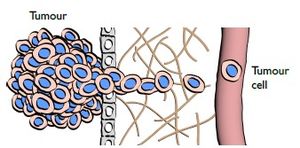Margherita Tavasso
Unravelling the cellular response of tumours near yielding
Often, primary tumours do not kill patients, but secondary tumours do. These so-called metastatic tumour cells disassociate from a primary tumour and, ultimately, prove fatal. Early detection of tumours and metastases is crucial for improving treatment strategies and cancer patient outcomes. Unfortunately, success in early detection is greatly inhibited due to our lack of information about cellular response and motion in complex environments during tumour growth and metastasis.
The aim of my project is to capture the yielding of a solid tumour in real time during deformation and flow, using rheometers combined with confocal fluorescence microscopy (from the single cell to tissue level), since cells inside a solid tumour behave like glassy materials with viscoelastic properties.
The project will provide a fundamental understanding of the physical events characterising the metastasis process and the outcomes will help establish the physical rules that can provide new opportunities and boundary conditions for future cancer therapy approaches.

Education
MSc. Università degli Studi di Napoli Federico II, June 2020
BSc. Università degli Studi di Napoli Federico II, January 2018
About me
Born and raised in Naples, Italy. I completed both my Bachelor’s and Master’s studies in Chemical -Engineering at Università degli Studi di Napoli Federico II (cum laude). For my Master’s research project, I joined the Biological and Soft Systems group at University of Cambridge, supervised by Prof. Pietro Cicuta. I developed a microfluidic device to study how the invasion of P.falciparum malaria parasite in red blood cells occurs in flow. My interest in soft living matter and microfluidics motivated me to pursue a PhD. Currently I am doing my PhD under the supervision of Dr. Pouyan E. Boukany.

M. Tavasso
PhD candidate
- +31 ()15 2786678 (secr)
- M.Tavasso@tudelft.nl
-
Building 58, E2.320
Van der Maasweg 9
2628 HZ DELFT
The Netherlands